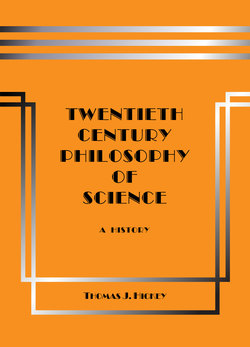Читать книгу Twentieth-Century Philosophy of Science: A History (Third Edition) - Thomas J. Hickey - Страница 45
На сайте Литреса книга снята с продажи.
3.14 Positivist Analytic-Synthetic Dichotomy
ОглавлениеIn addition to the descriptive observation terms that have primitive and simple semantics acquired ostensively, the positivist philosophers also recognized the existence of certain terms that acquire their meanings contextually and that have complex semantics. An early distinction between simple and complex ideas can be found in his Essay Concerning Human Understanding by the seventeenth-century British empiricist philosopher John Locke. The positivist recognized compositional meanings for terms occurring in three types of statements: the definition, the analytic sentence and the theory:
The first type of term having complex semantics that the positivists recognized occurs in the definition. The defined subject term or definiendum has a compositional semantics that is exhibited by the structured meaning complex associated with the several words in the defining predicate or definiens. For example “Every bachelor is a never-married man” is a definition, so the component parts of the word “bachelor” are “never-married” and “man”.
The second type occurs in the analytic sentence, which is an a priori or self-evident truth, a truth known by reflection on the interdependence of the meanings of its constituent terms. Analytic sentences contrast with synthetic sentences, which are a posteriori, i.e., empirical, and are thus deemed to have independent meanings for their terms. The positivists view the analytic-synthetic distinction as a fundamental dichotomy between the two types of statements. A similar distinction between “relations of ideas” and “matters of fact” can be found in An Enquiry Concerning Human Understanding by the seventeenth-century British empiricist philosopher David Hume.
An example of an analytic sentence is “Every bachelor is unmarried”. The semantics of the term “bachelor” is compositional and is determined contextually, because the idea of never having been married is by definition included as a component part of the meaning of “bachelor” thus making the phrase “unmarried bachelor” redundant. Contemporary pragmatists such as Quine in his famous paper “Two Dogmas of Empiricism” reject the positivist thesis of a priori truth. Quine maintains that all sentences are empirical.
